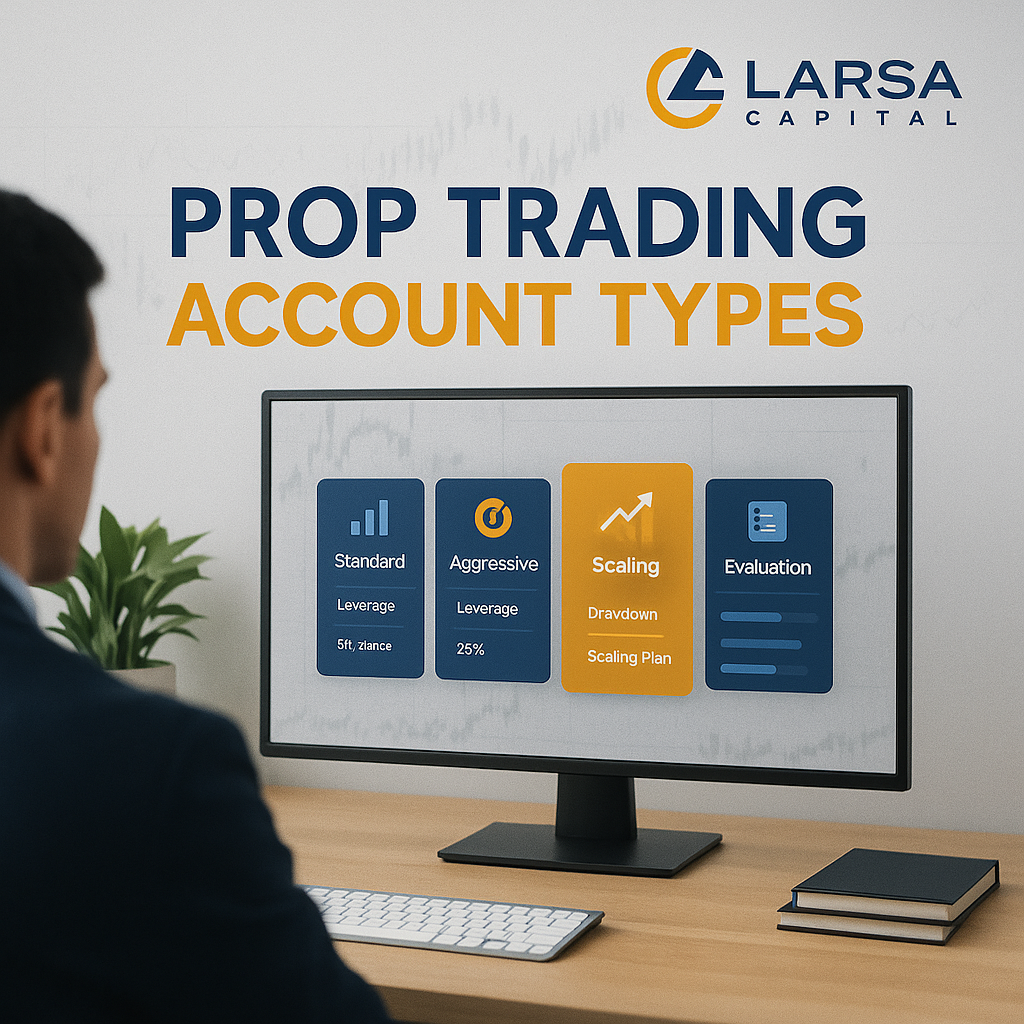Prop Trading Account Types: A Comprehensive Guide for Traders
Understanding Prop Trading Account Types
For aspiring traders, understanding various prop trading account types is essential. These account models influence your trading behavior, determine access to capital, and impact your growth path. Selecting the most suitable type boosts your performance while supporting long-term consistency.
What Are Prop Trading Account Types?
The term prop trading account types refers to the structures proprietary trading firms offer to participants. These accounts vary in their evaluation rules, funding availability, risk parameters, and growth incentives. Some cater to beginners looking for structure and safety, while others are built for seasoned traders.
Common Prop Trading Account Types Explained
Evaluation-Based Accounts
These accounts require passing an assessment phase before live capital is allocated. Traders meet profit targets while respecting drawdown and risk limits.
Pros: Reinforces discipline, supports learning.
Cons: Can be stressful and time-limited.
Instant-Funding Accounts
Skip evaluations and begin trading real capital immediately.
Pros: Immediate market access.
Cons: Higher fees and stricter rules may apply.
Scalable Funding Models
Consistent performance leads to access to larger capital and better payout terms.
Pros: Incentivizes consistency and discipline.
Cons: Often requires consistent monthly performance.
Swing-Friendly Accounts
Designed for holding trades overnight or over weekends.
Pros: More strategy flexibility.
Cons: Usually lower leverage and added holding conditions.
Simulation/Demo Accounts
Best for new traders to gain risk-free experience.
Pros: Safe environment for learning.
Cons: Doesn’t replicate real emotional trading conditions.
Matching Account Types to Your Trading Style
Scalpers
Choose accounts offering tight spreads, rapid execution, and minimal restrictions. Instant-funded models can be suitable.
Swing Traders
Look for swing-compatible accounts that allow longer holding periods without penalties.
Algorithmic Traders
Opt for API-ready accounts allowing easy strategy automation. Ensure technical support is available.
Beginner Traders
Start with simulation or evaluation accounts that include education tools and mentorship access.
What Separates One Account Type from Another?
Profit and Loss Targets
Each account type comes with unique benchmarks. Align with those that match your risk profile and strategy expectations.
Scaling Rules
Some accounts offer capital increases over time. Consider these if your focus is on long-term growth.
Platform Integration
Compatibility with MetaTrader, cTrader, or custom solutions is important for seamless execution.
Leverage Settings
Excessive leverage isn’t always better. Seek balanced risk-to-reward structures.
Extra Tools and Support
Evaluate access to reset options, analytics, coaching, or communities.
Larsa Capital’s Account Model Variety
Larsa Capital provides a flexible suite of prop trading account types that meet multiple trader profiles. It includes:
- Structured evaluations to foster growth
- Immediate access accounts for confident traders
- Clear scaling systems to reward consistency
- Support for swing, scalping, and automated strategies
With education, tracking tools, and live support, Larsa Capital builds an ideal environment for traders at any stage.
Selecting the Right Account Type
Keep these factors in mind:
- Experience: Match account features with your comfort level.
- Risk Profile: Understand maximum drawdowns and leverage conditions.
- Strategy Style: Some strategies need flexible timelines or specific rules.
- Tech Tools: Confirm that the trading platform supports your approach.
Avoiding Mistakes in Choosing an Account
Ignoring Fine Print
Review all terms related to fees, resets, payouts, and rules. Skipping details may cost you later.
Overleveraging
Don’t fall into the trap of choosing high-leverage accounts just for potential returns. Risk multiplies quickly.
Following Trends Blindly
Select an account that works with your trading logic—not because it’s popular.
Underestimating Account Complexity
Advanced account types may have requirements that are hard to meet for beginners.
Best Practices Before Choosing an Account
- Test the Waters: Start with simulations or low-barrier evaluations.
- Keep Records: Use a trading journal or analytics dashboard.
- Engage with Support: Don’t hesitate to ask questions before subscribing.
- Side-by-Side Review: Compare key elements like targets, fees, and payouts.
Why Prop Trading Account Types Matter
Understanding and selecting the right prop trading account type can be the difference between sustained success and premature exit. Your growth as a trader is not only about strategies but also about how those strategies are deployed within the framework you choose.
Firms like Larsa Capital offer diverse, structured, and supportive account models tailored to a variety of trading needs. Whether you’re just starting or scaling to higher capital levels, the right account sets the stage for progress.
Align your capital, risk tolerance, and strategy with the proper account—and build your edge step by step.

